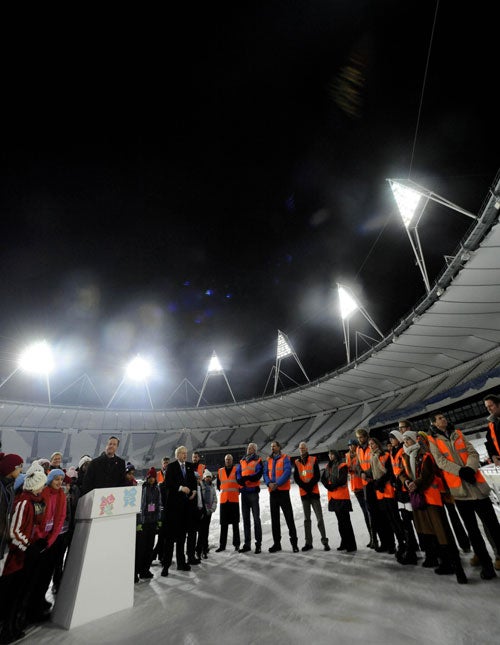The Last Word: Football needs to sort itself out at the top
New chairman must force the FA to become more efficient and representative of modern Britain

The reform of football domestically hangs over the Coalition Government. With London 2012 only 18 months away, I do not want to intervene in the running of the game but football has to take sensible steps to reform as it faces a Select Committee investigation next year before we are forced to act.
It must recognise that it needs to be both more efficient and representative of modern Britain. I welcome the nomination of David Bernstein as chairman of the Football Association with his strong background both in the business and football worlds. But the current governance arrangements and in particular the lack of female or black minority ethnic representation at the top of the game cannot be allowed to continue.
The challenge for the new chairman will be to build a stronger FA and develop our national game at all levels. England's showing in the World Cup in South Africa was one of the sporting lowlights of the past 12 months and will no doubt be one issue that will be near the top of the new chairman's in-tray. Unfortunately we will not be seeing a World Cup here for some decades. It was hugely disappointing to receive the best technical assessment for our 2018 bid, followed by an outstanding presentation in Zurich, but still receive the lowest number of votes.
From the moment that I stepped through the door of the Department for Culture, Media and Sport seven months ago as Sports and Olympics Minister it was clear that difficult and challenging funding decisions lay ahead in my dream job, one I had shadowed for five years. The fact that this country pays out in debt interest payments every day more than the Treasury's entire annual contribution to community sport put the economic climate sharply into focus.
We hit the ground running, though, immediately increasing sport's share of Lottery returns from 16 to 20 per cent, which will be worth around £50m a year by 2012. This helped protect funding for our medal hopefuls for London 2012 and Rio 2016. It also supported the launch of our £135m "Places People Play" legacy initiative that will improve community sports facilities up and down the country and encourage people to get out and play sport.
We also secured a commitment from major governing bodies including the England and Wales Cricket Board, Lawn Tennis Association and Premier League to invest at least 30 per cent of their net UK broadcast income into grass-roots sport.
We are working hard on bringing the Government's elite funding body, UK Sport, and our community sports body, Sport England, under one roof from 2012. This will see a unified single body created, a better structure for sports administration in this country and an opportunity to generate significant backroom savings.
As it was for all Government departments, the run-up to the Comprehensive Spending Review was an intense period for the DCMS. But with the support of Culture Secretary Jeremy Hunt, I believe that we achieved a good deal for sport.
Crucially, we were able to keep governing bodies' "Whole Sports Plans" in place. This is significant funding direct to 46 sports to invest in clubs, community projects and facilities to increase participation. Funding for the UK's largest grass-roots sports charity, the Football Foundation, was also maintained to help continue to improve the nation's football facility stock and give young people more opportunities to play the game.
It was to some people's surprise that we decided that the Olympic Games should not be immune to the pressures of the economic climate, but it is only right that we look to make savings where we can, as long as they do not compromise putting on a successful Games. It is down to the excellent management of the project by the Olympic Delivery Authority that we could find £27m worth of savings on the building of the Olympic venues.
The London 2012 project to date has been an amazing success story. This was highlighted by the Prime Minister David Cameron when he turned the Olympic Stadium lights on for the first time last week, more than 18 months before the Games. Next year will be the busiest in construction terms and significant operational challenges still lie ahead. But John Armitt, David Higgins and their team have performed wonders to have delivered 75 per cent of the Olympic Park on time and on budget while Seb Coe, Paul Deighton and their Organising Committee received praise from the International Olympic Committee for their handling of the project. With Wenlock and Mandeville, the fantastic 2012 mascots, set to tour around the country meeting children and the Olympic tickets going on sale in March momentum is really growing behind London 2012.
We are definitely proving that the UK is a great place to host international sports events, and this is an area I want to see grow. This is why I have asked UK Sport to increase their investment in major events to try to bring more world-class sporting events to this country.
Looking back on my first seven months, I sometimes wonder if my job is the political equivalent of the holding midfielder – preventing things going wrong and trying to keep sport moving forward. Despite the many difficulties and challenges, I feel enormously energised by this role and the future for British sport. With 2012 getting ever closer we have the most exciting period of sport in our lifetimes in front of us. I am determined that we all make the most of it.
Join our commenting forum
Join thought-provoking conversations, follow other Independent readers and see their replies
Comments
Bookmark popover
Removed from bookmarks